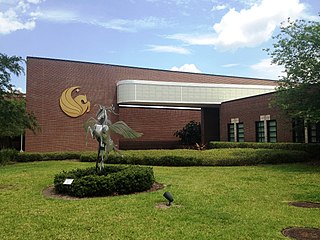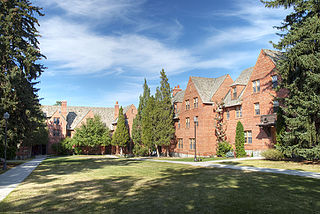Related Research Articles

The Texas Academy of Mathematics and Science (TAMS) is a two-year residential early entrance college program serving approximately 375 high school juniors and seniors at the University of North Texas. Students are admitted from every region of the state through a selective admissions process. TAMS is a member of the National Consortium for Specialized Secondary Schools of Mathematics, Science and Technology.

Marshall University is a public research university in Huntington, West Virginia, United States. It was founded in 1837 and is named after John Marshall, the fourth Chief Justice of the United States. The university is classified among "R2: Doctoral Universities – High research activity".

The Gates Cambridge Scholarship is an international postgraduate award for students to study at the University of Cambridge. The scholarship is extremely competitive with around 1.3% of applicants receiving an award in recent years.

The University of Alaska Anchorage (UAA) is a public university in Anchorage, Alaska. UAA also administers four community campuses spread across Southcentral Alaska: Kenai Peninsula College, Kodiak College, Matanuska–Susitna College, and Prince William Sound College. Between the community campuses and the main Anchorage campus, roughly 15,000 undergraduate, graduate, and professional students are currently enrolled at UAA. It is Alaska's largest institution of higher learning and the largest university in the University of Alaska System.

The Marshall Scholarship is a postgraduate scholarship for "intellectually distinguished young Americans [and] their country's future leaders" to study at any university in the United Kingdom. It is widely considered one of the most prestigious scholarships for U.S. citizens, and along with the Fulbright Scholarship, it is the only broadly available scholarship available to Americans to study at any university in the United Kingdom.

The National Merit Scholarship Program is a United States academic scholarship competition for recognition and university scholarships. The program is managed by the National Merit Scholarship Corporation (NMSC), a privately funded not-for-profit organization based in Evanston, Illinois. The program began in 1955.

The United States Presidential Scholars Program is a program of the United States Department of Education. It is described as "one of the nation's highest honors for high school students" in the United States of America.

Thurgood Marshall College (Marshall) is one of the eight undergraduate colleges at the University of California, San Diego. The college, named after Thurgood Marshall, the first African-American Supreme Court Justice and lawyer for the landmark 1954 Supreme Court case Brown v. Board of Education, emphasizes "scholarship, social responsibility and the belief that a liberal arts education must include an understanding of [one's] role in society." Marshall College's general education requirements emphasize the culture of community involvement and multiculturalism; accordingly Marshall houses the minors in Public Service and Film Studies for the campus. Significant academic programs and departments have come out of the college over many decades: Communication, Ethnic Studies, Third World Studies, African American Studies, Urban Studies & Planning, and Education Studies.
The John Marshall Scholars Program is an academic scholarship program that covers a majority of the cost of education for member students at Marshall University. Named to honor the Chief Justice of the United States John Marshall, the program affords a rigorous academic program and provides a full tuition/fees waiver and stipend to students with a composite ACT score of 30 or higher who have been accepted to the university. Students must maintain a 3.5 GPA in order to retain their scholarship.

The Schreyer Honors College is the honors program of the Pennsylvania State University. Founded in 1980 as the University Scholars Program, it was expanded and renamed in 1997 in response to a $30 million gift by William and Joan Schreyer. Schreyer was one of three honors colleges, along with those at Arizona State and Mississippi, to be listed by Reader's Digest in its "America's 100 Best" list published in May, 2005. On November 17, 2006, the Schreyers pledged an additional gift of $25 million to the Schreyer Honors College. Having contributed more than $58 million to Penn State, they were the largest family donors in the school's history, prior to the recent donation of $88 million from Terry and Kim Pegula for a new arena.

ASSIST is a nonprofit, international student exchange organization based in the United States and active in more than twenty countries worldwide. ASSIST places academically and extracurricularly excelling international students on one-year merit-based scholarships at American independent secondary schools.

The Pennsylvania Leadership Charter School (PALCS) is a public cyber charter school approved by the Pennsylvania Department of Education, and open to all students in grades K–12 who reside in the state of Pennsylvania.

The Anglo-American School in Sofia (AAS) is a private school founded in 1967 in Sofia, Bulgaria under the sponsorship of the American and British embassies.
The University of California, Irvine has over fourteen academic divisions.
The Kentucky Governor's Scholars Program (GSP) is a program to attempt to keep "the brightest" rising high school seniors inside the state of Kentucky. The program is a five-week program over the summer for students between their junior and senior years of high school. It is held at three different colleges across the commonwealth of Kentucky every year. The program is highly competitive with about a 50% acceptance rate. In order to get accepted, prospective scholars must have high academic achievement, including standardized test scores, and be active in the community. The application prompts students to list their academic, extracurricular, and volunteer achievements. In addition, students must write an essay to be accepted into the program. The program itself consists of various classes and other school activities. The 1,000 rising seniors that are selected yearly are eligible to receive scholarships to any in-state public university upon completing the program. This incentive is an effort to keep the most intelligent of the state, in Kentucky.

Burnett Honors College is an academic college of the University of Central Florida located in Orlando, Florida, United States. Founded in 1998 as the University Honors Program, it was expanded and renamed in 2002 in response to a $1.5 million gift by Al and Nancy Burnett. The current dean of the college is Sheila Amin Gutiérrez de Piñeres, Ph.D.
The Boettcher Scholarship is a four-year, full-tuition, and partial living expenses merit-based academic scholarship awarded to graduating Colorado high school students. On average, award recipients, rank in the top 2% of their graduating classes and have an average SAT score of 1400.
The African Leadership Academy (ALA) is an educational institution located in Roodepoort on the outskirts of Johannesburg, South Africa, for students between the ages of 16 and 19 years old, with current alumni coming from 46 countries.
The Flinn Scholarship is a merit-based scholarship awarded annually to 20 Arizona high school seniors. It provides four years of study at an Arizona public university, study abroad, a funded internship, personal mentorship by faculty and alumni Scholars, and other benefits. The total package is valued at more than $115,000.

The Honors College at Montana State University provides opportunities for students to study, conduct research, and exchange ideas in a challenging and supportive academic environment. In addition to learning from outstanding faculty members, honors students can attend special Honors seminars, take interdisciplinary Honors courses, and engage in independent study and research opportunities.
References
- ↑ "Chuck Yeager". Society of Yeager Scholars. Retrieved 2024-09-22.
- ↑ "Society of Yeager Scholars". Society of Yeager Scholars. Retrieved 2024-09-22.
- ↑ "Welcome to the Honors College". Honors College. Retrieved 2019-07-03.
- ↑ "About". Society of Yeager Scholars. Retrieved 2024-09-22.
- ↑ "Marshall introduces new class of Yeager Scholars". The Herald-Dispatch. 2017-05-02. Retrieved 2024-09-22.
- ↑ "The Society of Yeager Scholars announces 38th class of students at Marshall University". Marshall University News. 2024-05-06. Retrieved 2024-09-22.
- ↑ Vidovich, Dylan (2021-07-07). "Yeager Scholar from Logan discusses benefits of program, reflects on process". The Logan Banner. Retrieved 2024-09-22.
- ↑ Walker, Jim (2024-03-31). "D-B senior named as Yeager Scholar". The Tribune. Retrieved 2024-09-22.
- ↑ "Yeager Program". Honors College. Retrieved 2024-09-22.